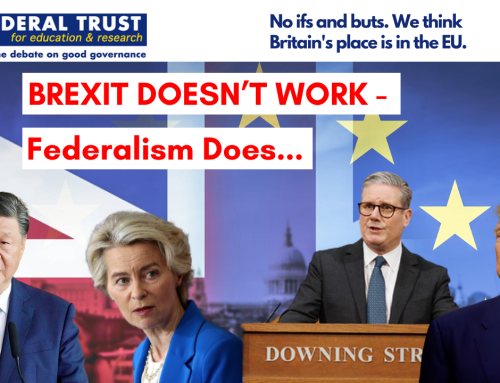by Glyndwr Cennydd Jones
In recent years, the national borders extant within these isles have been reaffirmed through Brexit and the Covid-19 pandemic. Further, the trend for significant divergence in policy stances across the various parliaments has compounded other clear political disagreements centred on constitutional reform and change, with different parties holding power in each institution for over ten years.
This situation has now been made even more pronounced by Sinn Fein’s May 2022 election victory in Northern Ireland, joining a Conservative UK government in London, a Labour senedd in Wales and an SNP parliament in Scotland.
Given that the traditional model of a federal UK is currently a politically problematic proposal and that secessionist tendencies are increasingly prevalent across the territories, there is a strategic need to explore some form of broad, constitutional compromise, which embraces the concerns of both unionists and nationalists, and moves away from a narrow ‘winner takes all’ answer to the challenges ahead.
Such a proposition is explored in my booklet A League-Union of the Isles.
The model proposes a confederation of Wales, Scotland, Northern Ireland, and England, with aspects of federal-type control built into key policy portfolios to reflect the principles of equality and solidarity among member nations. Each nation holds all powers and rights which are not by treaty assigned to joint institutions, operating distinct legal jurisdictions. The British monarch continues in role as Head of the League-Union.
A Council of the Isles acts with mechanisms in place to address the asymmetry between population sizes of member nations, specifically through the composition and distribution of seats. Members of the Council are typically elected for a four-year period by the electors of each nation, convening annually for a fixed time unless urgent business is demanded. The Council assumes its own standing orders, confirming a Presiding Officer and Executive whose Prime Minister and Ministers are responsible for enacting power on specific matters involving defence, foreign policy, internal trade, currency, large-scale economic considerations, and isles-wide affairs.
Each Bill considered by the Council is circulated to the National Parliaments of Wales, Scotland, Northern Ireland, and England, in advance of final reading, with member nations empowered to make objections or suggest amendments before voting. This provides a counterweight to any aspirations of the centre to aggregate power within its core, and to act unilaterally on issues such as defence and foreign affairs. On passing, the Head of the League-Union confirms the Bill as an Act of the Council of the Isles. The ultimate authority on the legitimacy of any laws and rights assigned to the centre remains with the Supreme Court.
A Committee of Member Nations (comprising the Council’s Prime Minister and Minister for Isles-wide Affairs, and the First Minister of each member nation), convenes regularly to discuss more general considerations which demand a degree of cooperation and harmonisation of laws across borders, over and above the key functions enacted in Council. These include: postal, telephonic and internet communications; railways, roads and associated licensing; airports, ports and traffic controls; coastguard and navigational services; energy, water and related infrastructure; income and corporation taxes; rates of sales, weights and measures; copyrights, patents and trademarks; scientific and technological research; broadcasting; meteorological forecasting; environmental protection; civil defence; emergencies, and the prevention of terrorism and serious crime.
The Committee, with the support of the Council, also holds controls for confirming contractual-type arrangements for supplying any requested public services to member nations. To cover the common functions and agreements in place, the Council levies charges upon each member nation according to a defined proportion of their GDP annually relative to that of the League-Union of the Isles as a whole. These monies are paid into a consolidated fund from which the interest on the UK public debt continues as a standing charge. The centre aims to promote equality across all territories by sharing a measure of baseline investment for infrastructure projects, operating formal instruments for resolving disagreements. National Parliaments are discouraged from misusing any advantages they possess in areas of potential contention including, for example, the economy of England, the oil of Scotland, and the water of Wales. Some central responsibility is also assigned for pensions and what are currently termed National Insurance Contributions (appropriately renamed), mitigating elements of financial risk and promoting ongoing solidarity. Further, federal-type mechanisms may be introduced to support fiscal decentralisation from the UK position.
The National Parliament of each member nation sits as the sovereign, legislative and representative body of its people, enacting powers and laws on every issue not identified as within the Council’s competence. A Government with executive powers, comprising a First Minister and other ministerial positions as required to oversee the various offices, is appointed from the nation’s parliamentary members. The superior judges are nominated on the advice of an independent authority. Nations further sub-divide their lands through Acts of National Parliament, defining the composition and responsibilities of local or regional authorities.
The challenge to both Conservative and Labour parties is to become more formally representative of the territories within their organisational structures. The make-up of the Liberal Democrats is already federalised, and the strength of the nationalist movements in Wales, Scotland and Northern Ireland is at a level uncommonly seen in other multinational states globally.
Might not such a new social, economic and security partnership of nations, which is directed by a limited, but mature, political legislature, allow the more collaborative elements of the political spectrum to find some common ground, if not a strategic compromise, in the constitutional form of confederal-federalism?
A League-Union of the Isles is available here as an e-book.

Glyndwr Cennydd Jones is an advocate for a UK-wide constitutional convention. He is a Fellow of the Institute of Welsh Affairs.







Why stop with a federal UK? Surely a federal British Isles, including all of Ireland, would resolve the long standing empasse within the island of Ireland and secure a permanent relationship between the UK and Ireland. Trade and culture within the British Isles have historic links and a federal relationship with all regions will secure their prosperity in the future.